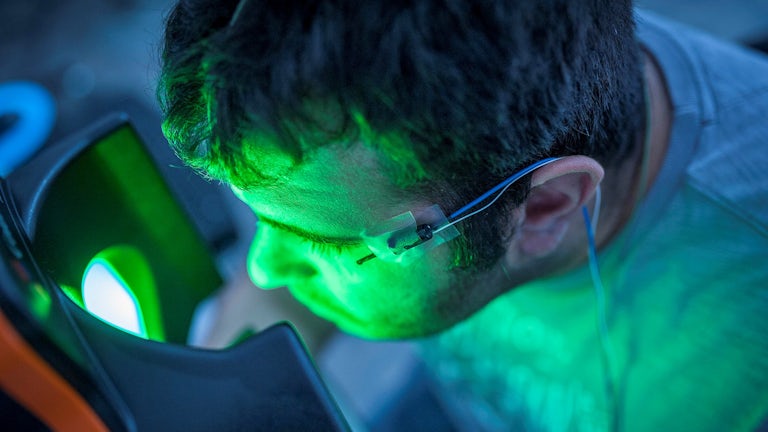Our highly multi-disciplinary group, which spans the School of Optometry and Vision Sciences and the School of Pharmacy and Pharmaceutical Sciences, comprises expertise in genetics, molecular and cellular biology, structural biophysics, ophthalmology and optometry, rational drug design and ocular drug delivery.
The research of the group focuses on the development of novel eye care treatments and products that lead to improved ocular health through an increased understanding of the causes of ocular disorders and improved methods of drug delivery.
Aims
To develop, evaluate and refine therapies for the effective treatment of ocular disorders
Research
Although a seemingly accessible target, many ocular conditions remain difficult to treat due to lack of full understanding of the mechanism by which they develop and progress, the impenetrability of the corneal epithelium, and an over-reliance on eye drop formulations which suffer from high drug losses due to nasolacrimal drainage.
We are investigating a range of novel therapies and ocular drug delivery platforms which you can find in the projects tab.
Projects
Development of enhanced ocular therapeutic delivery platforms
We are investigating a range of ocular drug delivery platforms and have a growing body of in vitro data that, in particular relates to the delivery of antimicrobials to treat corneal keratitis. Some of the delivery platforms include:
- Rational liquid (eyedrop) formulations based on an understanding of thermodynamics and solution chemistry.
- Nanoparticle and mucoadhesive spray or thermosensitive (sol-gel) formulations that facilitate ocular drug penetration.
- Drug loaded thin films that can be placed over the eye or under the eyelid, allowing the sustained release of drug into the tear film and eye.
- Drug loaded contact lenses which, when placed on the eye form a high concentration gradient and promote drug diffusion from the lens to the cornea.
- Microneedle-facilitated enhanced ocular drug delivery is a minimally-invasive technique for enhancing drug delivery to the cornea.
- Cryoprobe. We have developed a cryoprobe for transcorneal freezing to remove diseased corneal endothelial cells in patients with Fuchs’ Endothelial Corneal Dystrophy to allow more peripheral healthy cells to repopulate the cornea and recover endothelial function and corneal clarity.
Discovering the ophthalmic therapeutic potential of natural extracts
Since ancient times, the pomegranate fruit has been linked to activity against infection. We have shown that extracts of pomegranate also have anti-inflammatory properties, and research is currently underway to develop a new, pomegranate-based treatment for conjunctivitis, blepharitis, keratitis and associated ocular inflammation.
We are also investigating the potential of genipin, a naturally occurring cross-linker with antimicrobial properties derived from the plant Gardenia jasminoides, as a safe and effective treatment for very thin, weakened corneas, and for cases of infectious keratitis, which is a major worldwide cause of visual impairment and blindness.
Novel therapeutic interventions for mitochondrial optic neuropathies
There is a clear and clinical unmet need for novel therapeutic interventions in mitochondrial optic neuropathies. The most common mitochondrial optic neuropathies are Leber’s hereditary optic neuropathy (LHON) and autosomal dominant optic atrophy (ADOA). Both result in blindness and are currently untreatable. They arise as a consequence of genetic mutations in either mitochondrial or nuclear DNA and share the common characteristic of primarily affecting retinal ganglion cell (RGC) survival.
Our research will aim to be the establishment of a pipeline for the evaluation of the novel therapeutic interventions on RGC function and this read-out will be invaluable in directing further work on therapy for mitochondrial optic neuropathy.
Our research collaboration has a number of unique advantages:
- Firstly, we have a range of in vivo, ex vivo and in vitro model systems, such as the mouse model of mitochondrial dysfunction due to Opa1+/- mutation which displays RGC dendritic pruning and synapse loss at a slow rate.
- Secondly, through our collaboration with the Welsh School of Pharmacy, we have generated exciting and novel small molecules that have been validated in cellular and biochemical assays as being effective in reversing mitochondrial dysfunction.
Novel therapies for retinal degenerations
Retinal degenerations are the leading cause of incurable vision loss due to damage of the photoreceptive neurons and retinal pigment epithelium (RPE) which is essential for photoreceptor function and survival.
For most of us, the retina performs its function properly throughout the whole lifetime. However, an increased chronic exposure to light and oxidative stress have been considered as ones of the risk factors for development of age-related macular degeneration (AMD) - the leading cause of blindness of people above 60 years of age. About 30% of people in that age group develop at least first signs of the disease but its aetiology is still not clear, and the therapeutic options to delay vision loss are limited.
In our research, we investigate the mechanisms responsible for disease development and identifying potential targets for therapeutic intervention. Recent examples include a development of novel small molecules which can serve as ligands for opsin or P23H mutant opsin to enable their correct folding which in some types of LCA and RP can ameliorate endoplasmic reticulum stress thereby delaying photoreceptor loss.
Generation of in vitro corneal cell layers for ocular drug testing
We collaborate closely with clinician-scientists in Japan to generate in vitro corneal cell layers derived from human induced pluripotent stem (iPS) cells. The major current focus is on the corneal epithelium, but we plan to diversify into other ocular cell layers. Such technology has wide applicability for testing ocular medications.
Meet the team
Academic staff

Find out more about our research
Our research delivers advances in knowledge to facilitate detection, diagnosis, monitoring and treatment of vision disorders to improve quality of life.
Next steps
Research that matters
Our research makes a difference to people’s lives as we work across disciplines to tackle major challenges facing society, the economy and our environment.
Postgraduate research
Our research degrees give the opportunity to investigate a specific topic in depth among field-leading researchers.
Our research impact
Our research case studies highlight some of the areas where we deliver positive research impact.




